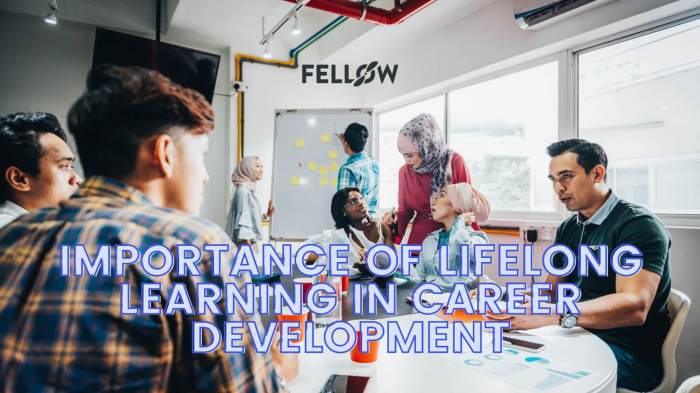
Lifelong learning for career changers exploring new avenues is crucial in today’s rapidly evolving job market. It’s not just about acquiring new skills; it’s about embracing change, identifying opportunities, and navigating the challenges of a career transition with confidence. This journey requires self-assessment, strategic learning, and a willingness to adapt to new industries and roles. It’s about taking control of your future and building a fulfilling career that aligns with your aspirations.
This guide explores the motivations behind career shifts, offering practical strategies for acquiring new skills and knowledge. We’ll delve into effective learning methods, discuss emerging career fields, and provide insights into building a strong portfolio and resume. Financial considerations, maintaining motivation, and fostering well-being are also integral components of a successful career change. The goal is to equip you with the tools and knowledge needed to navigate this exciting, albeit challenging, process.
Understanding Career Transitions
Career transitions are a common, often necessary, part of navigating a fulfilling professional life. Individuals may find themselves seeking new avenues for various reasons, moving beyond simply seeking a change from a displeasing job. Understanding the motivations, challenges, and strategies for successful transitions is key to making informed decisions and achieving desired career goals.Career changes aren’t always driven by dissatisfaction.
Many individuals seek new paths due to a desire for greater personal fulfillment, a need for skill development in emerging fields, or a shift in their long-term life goals. For example, someone might choose to transition from a corporate role to a freelance position to have more control over their schedule and work-life balance. Alternatively, a seasoned professional might transition to a new industry to explore a passion for a specific area, such as sustainable energy or technology.
Motivations Behind Career Changes
Individuals often seek career changes for a variety of reasons. These can include dissatisfaction with current compensation, lack of professional growth opportunities, or a mismatch between their skills and the demands of their current role. However, motivations often extend beyond these practical concerns. A strong desire for a better work-life balance, a yearning to pursue a passion, or a desire for increased personal fulfillment are also common drivers of career transitions.
Many professionals find themselves drawn to emerging industries or roles that align with their evolving interests and values.
Common Reasons for Career Changes
A significant driver of career changes is a desire for greater personal fulfillment. This might include pursuing a passion, seeking a better work-life balance, or a desire to contribute to a cause they are passionate about. Furthermore, a mismatch between skills and the demands of a current role, or a lack of opportunities for professional growth, can lead individuals to seek new paths.
Finally, a changing job market, with new technologies and emerging industries, may prompt professionals to adapt their careers. Economic factors, such as job security concerns or the need for higher earnings, can also be motivating factors.
Challenges and Anxieties Associated with Career Transitions
Transitioning careers can be daunting. Uncertainty about the future, fear of the unknown, and financial concerns are common anxieties. Navigating the job market, building a new network, and adapting to a new industry can also pose significant challenges. The pressure to prove oneself in a new environment and the need to acquire new skills can lead to feelings of inadequacy and self-doubt.
Key Skills and Attributes for Successful Transitions
Adaptability, resilience, and strong communication skills are crucial for navigating career changes. The ability to learn new skills quickly and embrace new challenges is essential. Furthermore, the ability to network effectively and build relationships with professionals in the desired field is key to accessing opportunities. A positive attitude and a proactive approach to problem-solving can greatly facilitate the transition process.
The Role of Self-Assessment and Goal-Setting
Understanding one’s strengths, weaknesses, and interests is crucial in planning a successful career shift. A thorough self-assessment helps in identifying transferable skills and areas for development. Establishing clear, achievable goals and a strategic plan for career advancement is vital for navigating the transition process effectively. A well-defined career path, with milestones and benchmarks, can offer a sense of direction and purpose, ultimately mitigating the anxieties associated with career transitions.
Lifelong Learning Strategies
Embarking on a career change often necessitates acquiring new skills and knowledge. This requires a proactive and adaptable approach to lifelong learning. This phase involves identifying your learning style, utilizing effective resources, and developing a sustainable learning plan. Success hinges on consistent effort and a positive mindset.Effective lifelong learning for career changers isn’t just about accumulating knowledge; it’s about applying that knowledge to new contexts and developing the skills needed to thrive in a new career path.
It involves a willingness to embrace challenges, adapt to new information, and recognize that learning is an ongoing process.
Effective Learning Methods
Learning new skills and knowledge requires a strategic approach. A variety of methods can be used, ranging from structured online courses to hands-on workshops. Choosing the right method depends on individual learning styles and the specific skills being acquired.
- Active Recall: Actively retrieving information from memory rather than passively rereading materials is a powerful technique. Flashcards, practice quizzes, and teaching concepts to others are effective methods for reinforcing learning and improving retention.
- Spaced Repetition: Reviewing material at increasing intervals strengthens memory and ensures long-term retention. This technique involves revisiting concepts at progressively longer intervals, adjusting the frequency based on individual learning needs.
- Experiential Learning: Hands-on activities, projects, and practical applications of new knowledge solidify understanding and provide valuable experience. Internships, volunteer work, or creating personal projects can be valuable methods for applying skills.
- Collaborative Learning: Engaging in discussions, group projects, and knowledge sharing with peers can foster a deeper understanding of concepts. Online forums, study groups, or mentorship programs can facilitate this type of learning.
Online Learning Resources
Numerous online platforms offer valuable resources for career changers. These resources can range from structured courses to informal learning communities.
- Platforms like Coursera, edX, and Udemy offer a vast array of courses in various disciplines. These platforms often provide structured learning paths and certification upon completion.
- Workshops and webinars focused on specific skills, such as project management or data analysis, provide concentrated learning experiences. These often offer practical exercises and immediate application.
- Online communities and forums dedicated to specific industries or career paths can provide valuable insights, networking opportunities, and support from experienced professionals. These communities can help career changers gain practical knowledge and find mentors.
Mentorship Programs
Mentorship can be invaluable for career changers. A mentor provides guidance, support, and practical insights based on their experience. A mentor can also offer invaluable connections and open doors to new opportunities.
- Professional organizations often offer mentorship programs connecting experienced professionals with aspiring individuals. These programs can provide structured support and tailored guidance.
- Networking events and conferences can provide opportunities to connect with potential mentors. These interactions can lead to valuable partnerships and support.
- Finding mentors online is another option. Online platforms and communities can connect individuals with mentors who share similar career goals.
Personalized Learning Plan
A structured learning plan can help career changers stay organized and motivated. This plan should be tailored to individual needs and learning styles.
| Phase | Activities | Timeline | Milestones |
|---|---|---|---|
| Phase 1: Skill Assessment | Identify target skills, research required knowledge, explore resources. | 1-2 weeks | Skills inventory, resource catalog |
| Phase 2: Focused Learning | Enroll in courses, attend workshops, practice new skills. | 3-6 months | Completion of relevant courses, practical skill application |
| Phase 3: Application and Practice | Build a portfolio, seek internships, network with professionals. | 6-12 months | Portfolio creation, networking events, job applications |
Integrating Learning into Daily Routines
Maintaining motivation and incorporating learning into daily routines is key to success. Setting realistic goals and creating a dedicated learning schedule can help to achieve long-term objectives.
- Schedule dedicated learning time in your daily routine, even if it’s just 30 minutes. This helps establish a consistent learning habit.
- Break down large tasks into smaller, manageable steps. This approach helps to prevent feeling overwhelmed and promotes progress.
- Celebrate milestones and acknowledge progress to maintain motivation and recognize achievements.
Exploring New Avenues
Career transitions often involve venturing into uncharted territory, requiring a proactive approach to explore new avenues. This exploration isn’t just about finding a new job; it’s about aligning your skills and passions with emerging opportunities. Understanding the landscape of high-demand fields and the necessary skills empowers you to make informed choices and build a fulfilling career path.
Emerging and High-Demand Career Fields
The job market is constantly evolving, with new technologies and societal shifts creating high-demand roles. Identifying these emerging fields is crucial for career changers looking for promising pathways. This section highlights key sectors and specific career opportunities within them.
- Technology: The tech sector continues to be a significant driver of economic growth. Specific areas like data science, cybersecurity, and cloud computing are experiencing substantial demand.
- Healthcare: The need for skilled professionals in healthcare is consistently high, especially in areas like telehealth, medical technology, and patient care management. The aging global population further increases the need for medical professionals.
- Renewable Energy: With growing global concerns about climate change, the renewable energy sector is experiencing rapid growth. Roles in solar panel installation, wind turbine maintenance, and energy storage are among the key areas.
- Fintech: The integration of technology into finance has created new opportunities in areas like financial technology (Fintech) and investment management. Roles in financial analysis, fintech development, and digital asset management are prominent.
- Sustainability and Environmental Science: This sector is seeing increasing demand as environmental concerns gain prominence. Careers in environmental consulting, sustainability management, and renewable energy engineering are all growing areas.
Specific Skills for Emerging Fields
To excel in these emerging fields, developing the right skill set is paramount. This table highlights some key skills required in different areas.
| Industry | Career Field | Required Skills |
|---|---|---|
| Technology | Data Analyst | Data analysis, statistical modeling, programming (e.g., Python, R), data visualization, critical thinking, problem-solving |
| Healthcare | Telehealth Specialist | Healthcare knowledge, communication skills, technology proficiency (video conferencing, software platforms), patient care experience |
| Renewable Energy | Solar Panel Installer | Technical skills in installation and maintenance, safety protocols, knowledge of solar panel systems, problem-solving |
| Fintech | Digital Asset Manager | Financial knowledge, technology proficiency, market analysis, investment strategies, risk management, regulation understanding |
| Sustainability and Environmental Science | Environmental Consultant | Environmental science knowledge, data analysis, communication, problem-solving, report writing, project management |
Networking and Professional Development
Building a strong professional network is essential for career advancement, regardless of the industry. It opens doors to new opportunities and provides valuable insights into industry trends.
Actively participate in industry events, join professional organizations, and connect with individuals in your desired field on platforms like LinkedIn. This active engagement helps you stay informed about industry trends and potential career paths.
Identifying Opportunities for Professional Development
Continuous learning and skill development are vital for career growth in any field. Look for opportunities to upskill or reskill in areas relevant to your chosen career. Consider professional certifications, online courses, workshops, and mentorship programs.
So, you’re a career changer, itching to explore new fields? Lifelong learning is key, and keeping your skills sharp is crucial. Modern tech, like the Nvidia Optimus gives laptops a graphical gearshift , can help with the technical side of things, offering powerful graphics for various tasks. This makes it easier to learn and adapt in your new career path.
Learning new skills, adapting to new technologies, and embracing lifelong learning are all vital in this exciting journey of career exploration.
Resources for Exploring Career Options
Various resources can assist in exploring career options and understanding industry trends. Online platforms, career counseling services, and industry publications provide valuable information.
- Online platforms (LinkedIn, Indeed, Glassdoor): Offer insights into job market trends, company reviews, and salary information.
- Industry publications (e.g., trade journals, magazines): Provide up-to-date information about emerging trends and best practices in specific sectors.
- Career counseling services: Offer personalized guidance to explore career options and develop a career plan.
Building a Portfolio and Resume
A strong portfolio and resume are crucial for career changers to effectively communicate their skills and experience to potential employers. They serve as a tangible demonstration of your capabilities and a compelling narrative of your journey. Crafting these documents requires a strategic approach, showcasing transferable skills and highlighting your value proposition in a new industry. This section delves into the specifics of building a portfolio and resume, tailored for career changers entering a new field.
Importance of a Portfolio
A portfolio is a dynamic showcase of your skills and accomplishments. It’s not just a collection of work; it’s a curated narrative that demonstrates your capabilities and value proposition to potential employers. By showcasing your projects and accomplishments, you provide tangible evidence of your abilities, making your application stand out.
Types of Portfolios for Different Fields
Tailoring your portfolio to the specific career field is essential. Here are examples of portfolio types:
- Designers: A portfolio showcasing a range of design projects, including logos, websites, illustrations, and graphic designs. This should include a variety of projects that highlight different design styles and techniques, demonstrating adaptability and a mastery of design software.
- Software Developers: A portfolio featuring projects that showcase coding skills, problem-solving abilities, and software development methodologies. Examples might include interactive applications, mobile apps, or web applications, highlighting clean code, user experience, and efficiency.
- Marketers: A portfolio that demonstrates marketing strategies, campaign results, and data analysis. This could include case studies of successful campaigns, demonstrating an understanding of marketing principles and the ability to achieve measurable results. This section could include examples of content marketing, social media campaigns, or email marketing efforts.
- Writers and Editors: A portfolio of published articles, blog posts, website content, or other writing samples. The portfolio should showcase diverse writing styles, demonstrate understanding of different writing contexts, and include an overview of editing experience.
Crafting a Resume Highlighting Transferable Skills
A resume for a career changer needs to highlight transferable skills. These are skills applicable across different industries and roles. Examples include problem-solving, communication, teamwork, leadership, and time management. The resume should clearly articulate how these skills have been applied in previous roles and how they directly translate to the desired new role.
Sample Resume for a Career Changer (Marketing Role)
| Name | Contact Information |
|---|---|
| Jane Doe | (123) 456-7890 | [email protected] | LinkedIn Profile URL |
| Summary | Highly motivated and results-oriented professional with 10+ years of experience in customer service and sales, seeking a Marketing role to leverage proven communication and problem-solving skills. Passionate about creating engaging campaigns that drive business growth. |
| Experience |
|
| Skills |
|
| Education | University Name, Degree (e.g., Bachelor of Science in Business Administration) |
| Projects (Optional) | Highlight relevant projects from your previous roles or personal initiatives that showcase skills. |
Utilizing Online Platforms and Tools
Online platforms like LinkedIn, portfolio websites, and job boards are vital for career changers. A professional LinkedIn profile, showcasing your skills and experience, is crucial. A dedicated portfolio website provides a space to showcase your projects and demonstrate your abilities. Utilize online job boards and resources to enhance your online presence and visibility to potential employers.
Addressing Financial Considerations: Lifelong Learning For Career Changers Exploring New Avenues

Navigating a career transition often involves significant financial adjustments. Understanding the potential financial implications, developing strategies for managing finances, and exploring available support options are crucial for a smooth transition. This section dives into the financial realities of career changes, empowering you to plan effectively and manage your resources.Financial transitions during career shifts can be complex. Unexpected income loss, coupled with increased expenses associated with job searching, education, or skill development, can create financial pressure.
However, proactive planning and resourceful strategies can mitigate these challenges.
Potential Income Loss and Expenses
A career change frequently means a period of reduced or uncertain income. This might involve unemployment benefits, temporary lower salaries, or time spent actively job hunting. Expenses may also increase during this transition, such as costs associated with retraining courses, professional certifications, or job-seeking materials. The amount of income loss and expenses can vary widely based on the specific career path and individual circumstances.
So, you’re a career changer, exploring new paths? Lifelong learning is key, and staying connected is crucial. Tools like all things appy top 5 firefox social networking tools can help you connect with like-minded individuals and discover new opportunities. This kind of networking can be invaluable in navigating a career shift, helping you learn from others’ experiences and stay updated on industry trends.
It all contributes to your continued professional growth and success.
Consider the cost of your current living expenses, and project a possible reduction in income.
Strategies for Managing Finances
Effective financial management during a career change is essential. Budgeting plays a critical role in navigating this period. A well-structured budget can help you track income and expenses, identify areas where you can cut back, and ensure you have enough money to cover your needs. A detailed budget template will be provided later in this section to assist in this crucial step.
Funding Options for Career Changers
Several funding options are available to career changers to support their transition. These options range from grants to loans, each with its own set of eligibility criteria and terms. Researching and understanding the various options can provide much-needed financial support.
Career changers often need to upskill to explore new avenues, and that’s a fantastic journey. Just like AMD is trying to innovate in the tech space, by aiming to shimmy into ultrabook turf with ultrathins here , we all need to adapt and learn new skills to succeed in a constantly evolving job market. This continuous learning mindset is key to navigating the ever-changing landscape of career paths.
Grants and Loans
Grants are typically awarded based on specific criteria and may be available for vocational training or educational programs. These are typically need-based and may not require repayment. Loans, on the other hand, require repayment, but they can provide financial backing for training or skill development. Eligibility requirements vary significantly based on the specific grant or loan program.
Consult with financial advisors or educational institutions to explore suitable options.
Detailed Budget Template
Monthly Budget Template | Category | Estimated Income | Estimated Expenses | |--------------------|-------------------|--------------------| | Salary/Income | | | | Unemployment Benefits | | | | Other Income | | | | Housing | | | | Utilities | | | | Food | | | | Transportation | | | | Healthcare | | | | Debt Repayment | | | | Training/Education | | | | Job Search Expenses| | | | Savings/Investments | | | | Miscellaneous | | | | Total | | | | Net Income | | |
This template provides a framework for tracking your income and expenses.
Be sure to fill in the blanks with realistic estimations of your income and expenditure. Adjust this template based on your individual circumstances. Remember to regularly review and adjust your budget as needed.
Maintaining Motivation and Well-being

Navigating a career change is a significant undertaking, demanding resilience and a strong sense of self. Maintaining motivation throughout the learning process and prioritizing well-being are crucial for success. This phase isn’t just about acquiring new skills; it’s about nurturing your mental and emotional health to sustain the journey. This section Artikels strategies to keep you focused, supported, and empowered during this transition.
Fueling Your Motivation
Sustained motivation is key to achieving your career goals. Maintaining a positive mindset and a clear vision of your desired outcome are essential. Setting realistic, incremental goals will help you track progress and avoid feeling overwhelmed. Celebrate small victories along the way to reinforce positive momentum. Breaking down large tasks into smaller, manageable steps fosters a sense of accomplishment, which in turn, boosts motivation.
Prioritizing Self-Care, Lifelong learning for career changers exploring new avenues
Career transitions often bring increased stress and anxiety. Prioritizing self-care is not a luxury, but a necessity for navigating this period effectively. Establishing a consistent self-care routine, incorporating activities that promote relaxation and rejuvenation, is essential. This could include daily exercise, mindfulness practices, or engaging in hobbies that bring joy. Regular sleep, a balanced diet, and adequate hydration are foundational elements of a healthy self-care routine.
Building a Support Network
A strong support network can provide invaluable encouragement and guidance during challenging times. Connecting with mentors, friends, and family who understand your aspirations and goals can offer perspective and encouragement. Seeking advice from individuals who have successfully navigated similar transitions can provide valuable insights and reduce feelings of isolation. Networking with other career changers can also foster a sense of community and shared experience.
Connecting with Other Career Changers
Sharing experiences and strategies with peers navigating similar transitions can be profoundly beneficial. Connecting with other career changers offers a unique opportunity for support, inspiration, and practical advice. Online forums, support groups, and networking events can be excellent platforms for connecting with like-minded individuals. The shared experiences and perspectives of others can offer a wealth of valuable information.
Mental Well-being Resources
Numerous resources are available to support mental well-being during career transitions. Consider exploring online resources such as articles, blogs, and podcasts that offer insights and practical strategies for managing stress and anxiety. Therapy or counseling services can provide personalized support and coping mechanisms. Many communities offer workshops and seminars focused on career transitions, stress management, and well-being.
Local community centers and mental health organizations can also provide valuable resources and guidance.
Final Thoughts
In conclusion, lifelong learning is paramount for career changers seeking new opportunities. This journey involves understanding personal motivations, developing effective learning strategies, exploring emerging fields, and building a strong professional foundation. By embracing the challenges and utilizing the resources available, career changers can successfully navigate transitions, build fulfilling careers, and thrive in a dynamic job market. The key is to approach this process with a proactive mindset, embracing continuous learning, and seeking support along the way.






